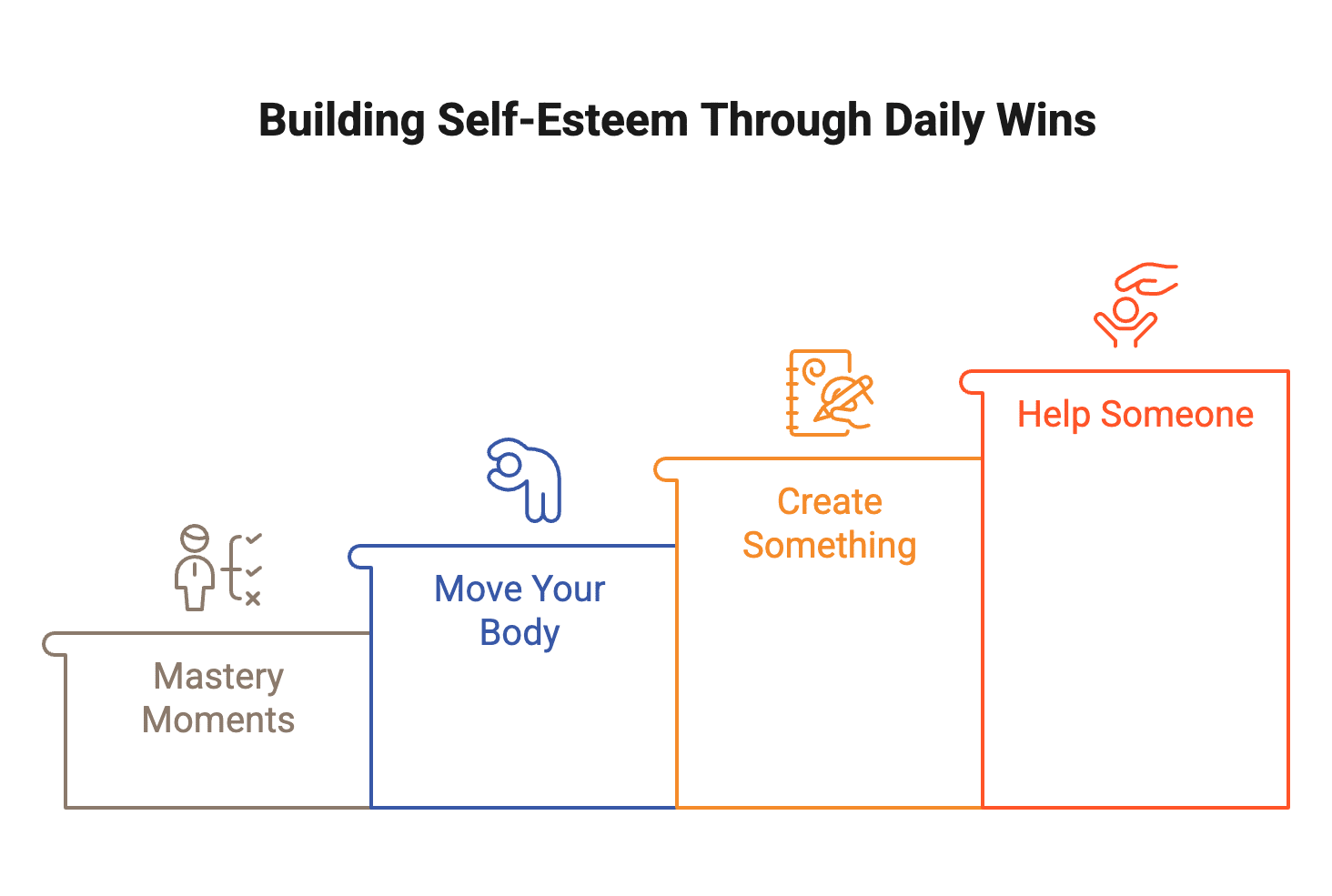From Comparison to Confidence: How to Protect Your Self‑Esteem in the Age of Social Media
Self‑esteem is how you see your own worth and it ties closely to your mental health. In a high‑pressure city like DC, it’s easy to slide into low self‑esteem when your day is full of highlight reels, public wins, and constant feedback. High self-esteem is associated with improved mental and physical health, making it a crucial aspect of overall well-being. The goal of this guide is simple: fewer compare‑and‑despair moments, more steady, healthy self‑esteem you can feel in daily life.
What does social media comparison do to self-esteem?
Social media makes it simple to compare your everyday life to someone else’s best moments. That tilt toward “upward comparison” can leave you feeling not‑enough, push perfectionism, and drain motivation. Negative messages received from teachers, friends, family, and the media can also contribute to this cycle, reinforcing feelings of inadequacy. When that pattern sticks, low self-esteem often shows up as all‑or‑nothing thinking (“If it isn’t perfect, it’s a failure”), harsh self‑talk, and pulling back from risks that would actually build confidence.
Here’s what helps: treat self‑esteem like a muscle. You don’t need a total life reset; you need small, repeatable moves that restore balance. Skills from CBT for low self‑esteem target the thoughts and habits that keep comparison cycles running, so you can try, learn, and adjust instead of freeze and avoid. Increased resilience, developed through these practices, allows individuals to cope with setbacks and recover from life’s challenges. You can also work on self‑esteem through group programs that build confidence and social connection, which can be especially grounding in an achievement‑focused town.
How can I spot perfectionism and negative self‑talk that lowers self-esteem in real time?
Perfectionism hides in plain sight. Watch for these telltale signs:
- All‑or‑nothing rules: “If I don’t hit every target, it doesn’t count.”
- Should‑storms: Long lists of “shoulds” with no room for learning.
- Catastrophizing: Small slip → huge story about your worth.
Try a 30‑second check on your phone notes when you notice a spike of low self-esteem:
- Name the trigger. What just happened?
- Catch the thought. What did you tell yourself?
- Reframe it. Ask: Is it accurate? Is it helpful? What’s a kinder, truer read?
This is the core move in cognitive‑behavioral tools for self‑esteem, which teach you to test thoughts, reduce avoidance, and take small actions that build mastery.
What steps reduce social media comparison to boost self esteem (without quitting)?
- Feed hygiene. Unfollow or mute accounts that spike shame. Follow creators who teach, not just flex.
- Intentional use. Set a clear purpose before opening an app (learn, connect, share), and time‑box sessions.
- Active over passive. Swap scrolling for DM’ing a friend, learning a skill, or posting one values‑aligned thing.
- Protect sleep. Put phones to bed outside the bedroom. Confidence feels stronger after rest.
If structure helps, brief online CBT skills can guide daily practice and reduce the traps that pull self‑esteem down.
How does self compassion build healthy self esteem?
Self‑compassion isn’t letting yourself off the hook. It’s treating yourself like a good friend while taking responsibility. The practice has three parts: notice what you’re feeling (mindfulness), remember others struggle too (common humanity), and speak to yourself with warmth (kindness). Self-esteem plays an important role in Maslow’s hierarchy of needs, depicting esteem as a basic human motivation essential for personal growth and fulfillment.
Why it matters for healthy self esteem: self‑compassion reduces harsh self‑criticism, helps you try again after setbacks, and supports realistic goals. You can start with tiny reps:
- Hand on heart, name it. “I’m anxious and disappointed. This is hard.”
- Write a kinder line. “What would I say to a friend in this exact spot?”
- Take one next step. One email. One paragraph. One block walk.
These quick exercises come from compassion‑focused approaches designed to quiet self‑attack and build inner safety, and you’ll also see benefits from self‑compassion practices delivered in brief, accessible formats.
What small daily wins boost self-esteem?
Confidence grows when you turn values into small, finishable actions that boost self esteem. Pick goals you can complete in 5–20 minutes and track them. Each tiny win becomes proof that you can act, learn, and improve. For example, volunteering for a local cause can also boost self-esteem by providing a sense of purpose and a reminder of one’s own value.
- Mastery moments. One tough email, one paragraph, one chore—done today.
- Move your body. A brisk walk or a 10‑minute stretch counts.
- Create something. A photo, a sketch, or a cooked meal—small output, big signal.
- Help someone. Send a supportive text or share a useful resource.
These steps mirror CBT routines that strengthen self‑esteem, which use small, repeated actions to challenge harsh beliefs and grow confidence through experience.
When should I consider therapy for low self esteem in DC?
Reach out if low self esteem is sticking around and getting in the way—at work or school, in dating, with friends, or in how you talk to yourself. Signs include rigid perfectionism, strong body‑image distress, isolation, or a steady hum of self‑criticism.
At Therapy Group of DC, we match you with a therapist who fits your goals. Care often blends:
- CBT skills to spot thinking traps and practice new behaviors.
- Self‑compassion practices to reduce self‑attack and build inner safety.
- Depth‑oriented work to update core beliefs and relationship patterns that keep confidence low.
Your first session covers your story, what you’ve tried, and what “better” looks like in your daily life in DC. Together, we’ll choose a plan that fits your time, energy, and privacy needs.
Quick self esteem tools you can save to your phone (copy‑paste friendly)
- Reframe Script
Trigger → Thought → Kinder alternative → Tiny action.
Example: “Didn’t get a reply.” → “I’m being ignored.” → “There are many reasons for delays.” → “Send one clear follow‑up.” - Two‑Minute Reset
4 slow breaths → Name the feeling → Name one need → Pick the next best step.
Example: “Tense and discouraged” → “I need a small win” → “Finish the one‑page brief.” - Feed Hygiene Checklist
Unfollow/mute shame triggers → Time‑box use → Open with a purpose → Post one values‑aligned thing.
Quick next step: Start building healthy self esteem in DC
If you’re done with compare‑and‑despair and want guided support, Therapy Group of DC can help. We’ll match you with a therapist trained in CBT, self‑compassion work, and depth‑oriented therapy. No pressure—just clear steps and steady support.
Therapy Group of DC is located in Dupont Circle and welcomes people from across the DMV. If you’re ready to boost self esteem and steady your confidence, we’re here to help.
Frequently Asked Questions About Self-Esteem
What factors affect self esteem throughout a person’s life?
Many factors affect self esteem, including genetic factors, life events, social interactions, and messages from parents, peers, and society. Experiences during childhood, such as positive feedback and nurturing relationships, play an important role in how self esteem develops and influences a person’s life into old age.
How does low self esteem tend to impact mental health?
Low self esteem is closely linked to mental health issues such as anxiety and depression. Negative thinking and self doubt can lead people to withdraw from social situations, avoid challenging tasks, and struggle with healthy relationships, which may further exacerbate mental illness symptoms.
What are some ways to build strong self esteem and positive self regard?
Building strong self-esteem involves practicing self-compassion, challenging negative thoughts, focusing on strengths, and setting achievable goals. Positive relationships and supportive environments also contribute to a healthy self image and self respect, helping individuals develop a positive view of themselves as a human being who deserves happiness.
How does a child’s self esteem develop and why is it important?
A child’s self esteem develops early in life and is shaped by parenting, social experiences, and self talk. Encouraging children with positive messages and modeling confidence helps them build self-confidence and resilience, which supports their well-being and ability to meet goals as they grow.
Can therapy help improve self esteem and how?
Therapies such as cognitive behavioral therapy (CBT) can help individuals become aware of negative messages and thought patterns that affect self esteem. Therapy provides tools to reframe negative thinking, build self love, and develop healthier social psychology, ultimately supporting better mental health and psychosomatic medicine outcomes.


